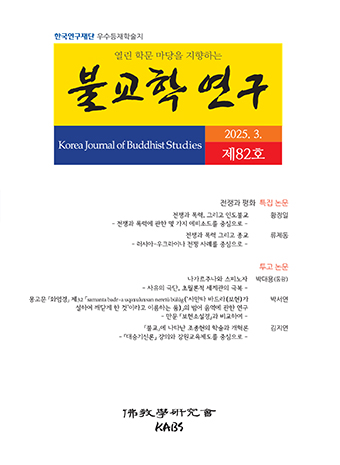Abstract
References
Sorry, not available.
Click the PDF button.
Information
The human mind usually acts in subject-object-division and through this act it gathers all kinds of differentiating knowledge about the world. However Buddhism tries to arrive at non-differentiating knowledge and declares that the human mind essentially acts in an undivided way. This act, which is the absolute un-differentiating knowledge of self, is the nature of human mind. Buddhism refers to this as Empty Spiritual Knowledge'(空寂靈知).German Idealism shares the same opinion as Buddhism about the essential nature of the human mind. It proves that all kinds of empirical activities of the mind depend on one absolute act. It considers this absolute act as the nature of the human mind and calls this Fact-Act'(Tathandlung, 事行).In this paper I will argue that the Empty-Spiritual-Knowledge in Buddhism and the Fact-Act in German Idealism are the transcendental essence of human beings as undivided Absolute One, which comprehends both oneself and world, mind and body(matter), knowing and being, etc. Insofar they are of the same opinion. However in the method of recognizing the nature of human mind as such and how to actualize it in reality, they don't agree. Buddhism teaches the way of spiritual meditation, while the German Idealism chooses the path of practical or political activity. should be different from relativism which goes only its own way without concern others. It is as open as they can convert to other religion with volition to learn other faith and reform themselves. Therefore the opening must not be strategic but be honest one. This honest opening might be possible only in the case of tentative self-denial. Without this tentative self-denial there can't be self-transcendency and without self-transcendency it is impossible to make true reconciliate or agreement. Then, the true multi-religious pluralism can be possible from self-denial. Buddhism is the religion to make self-denial. The foundation of self-denial of Buddhism can obviously be found in the absence of ego theory, the Dharma of pratítya-samutpãda, the upãya theory, the middle way theory.
Click the PDF button.
- Publisher :Korean Association of Buddhist Studies
- Publisher(Ko) :불교학연구회
- Journal Title :Korean Journal of Buddhist Studies
- Journal Title(Ko) :불교학연구
- Volume : 5
- Pages :87~124


 Korean Journal of Buddhist Studies
Korean Journal of Buddhist Studies






